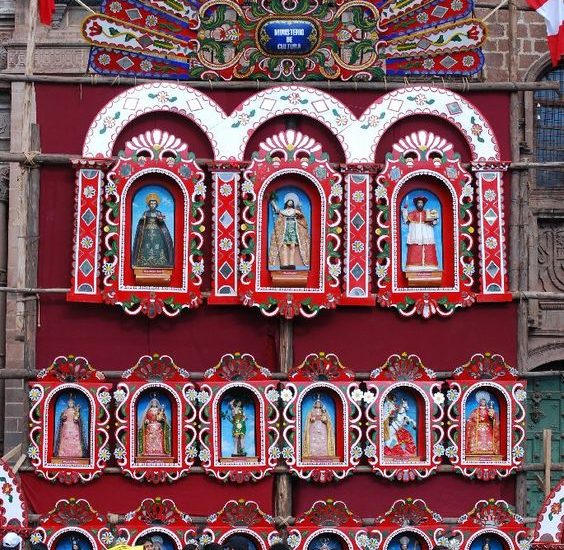The Corpus Christi festivity in Cusco, Peru (literally, Body of Christ) is a religious festivity held 60 days after Easter Sunday. It’s celebrated worldwide by devoted Catholics, however, Cusco is special because it blends the best of two different cultures. The Spaniards brought this feast after the conquest, while the Andean traditions were still in the hearts of the people of Cusco.
This vibrant celebration gathers “Cusqueños” (Cusco citizens) of all social groups to dance, sing, flood the streets, and have fun. The celebration consists of a procession of 15 huge statues all over the Cusco Historic Centre. However, first, let’s see some history of this special celebration.
History of Corpus Christi
The Incas honored their ancestors and worshipped the moon, the earth, and even animals. But their most important god was the Sun, or as they called it, “Inti”. When the Spaniards invaded Peru, they saw Andean sun-worshipping celebrations and parades of their former rulers’ mummified corpses. To convert the locals to Christianity, they replaced their festivals with the 15 saints and virgins still in the Cusquenian procession.
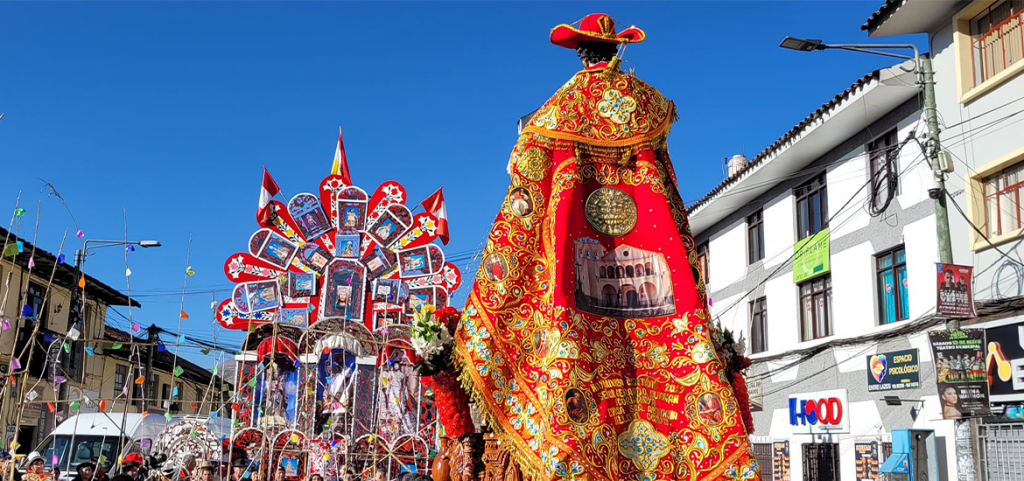
Entry of the Saints
On the eve of Corpus Christi, each saint’s effigy leaves its church or temple. This happens during “La entrada de los Santos,” and the effigies are escorted by their loyal supporters. The supporters dance and play regional music. Although it appears they are all close to the main venue of the event, many of them go over 10 kilometers to get there.
“El arco de Santa Clara”, or St. Claire’s Triumphal Arch, is the place where all saints end up. They go from there to the “San Pedro” church, where you can see the ceremonial handing over of the cathedral keys from “San Pedro” to “San Antonio”. The procession continues to the cathedral’s entryway once all of the saints have been gathered, and they will stay there for a full week until the “Octava”, or the eighth week after Easter. The saints that participate in Corpus are the following:
| San Antonio (Saint Anthony) from the San Cristobal Parish |
| San Jeronimo (Saint Jerome) from the District Parish of San Jeronimo |
| San Cristóbal (Saint Christopher) from the Parish of San Cristobal |
| San Sebastian (Saint Sebastian) from the District Parish of San Sebastian |
| Santa Barbara (Saint Barbara) from the District Parish of Poroy |
| Santa Ana (Saint Anne) from the Parish of Santa Ana |
| Apostol Santiago (Apostle James) from the Parish of Santiago |
| San Blas (Saint Blas) from the Parish of San Blas |
| San Pedro (Saint Peter) from the Parish of San Pedro |
| San José (Saint Joseph) from the Parish of Belén |
| Virgen de la Natividad (Our Lady of the Nativity) from the Parish of Almudena |
| Virgen de los Remedios (Our Lady of Remedies) from the Church of Santa Catalina |
| Virgen Purificada (Holy Virgin) from the Parish of San Pedro |
| Virgen de Belen (Our Lady of Bethlehem) from the Parish of Belen |
| Virgen de la Inmaculada Concepción (Our Lady of Immaculate Conception) from “Basilica de la Catedral”. |
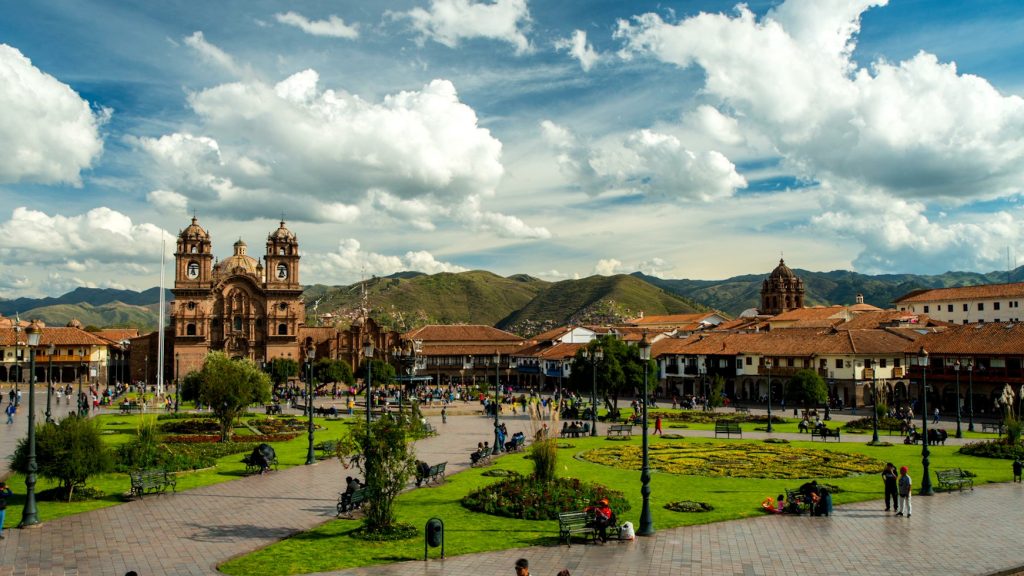
The Main Event
The archbishop of Cusco celebrates Mass on Thursday mornings in the Cusco cathedral. One by one, the ten saints and five virgins leave the cathedral and walk around the “Plaza de Armas” (Cusco’s main square). The bearers endure strain from the weight of the metal and wood molds.
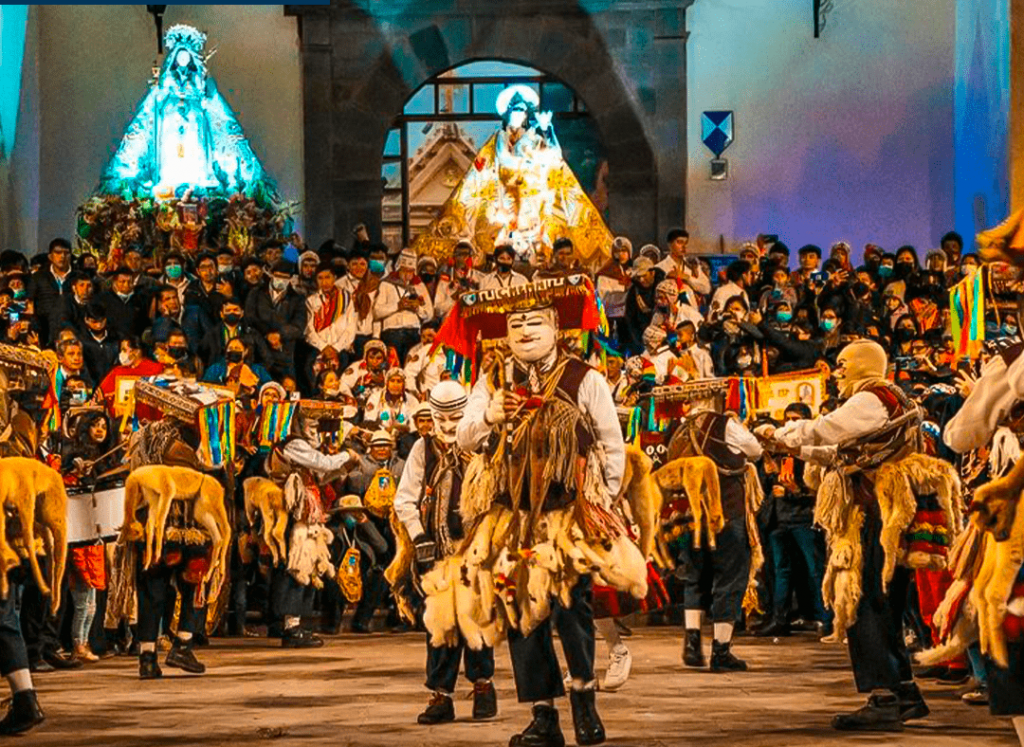
The atmosphere is raised several notches by dance troupes executing prearranged routines and brass bands playing melancholy songs. The day ends when the night comes when the last statue is placed in the cathedral while everybody is leaving singing, drinking, and dancing.
Food to Celebrate
“Chiri Uchu” which means in the Inca language “cold dish”, is a typical food of Cusco during this time. Some people believe that this meal was created during the Inca Empire. This dish consists of a large platter and has a variety of meats, including jerky, chicken, beef, and guinea pig.
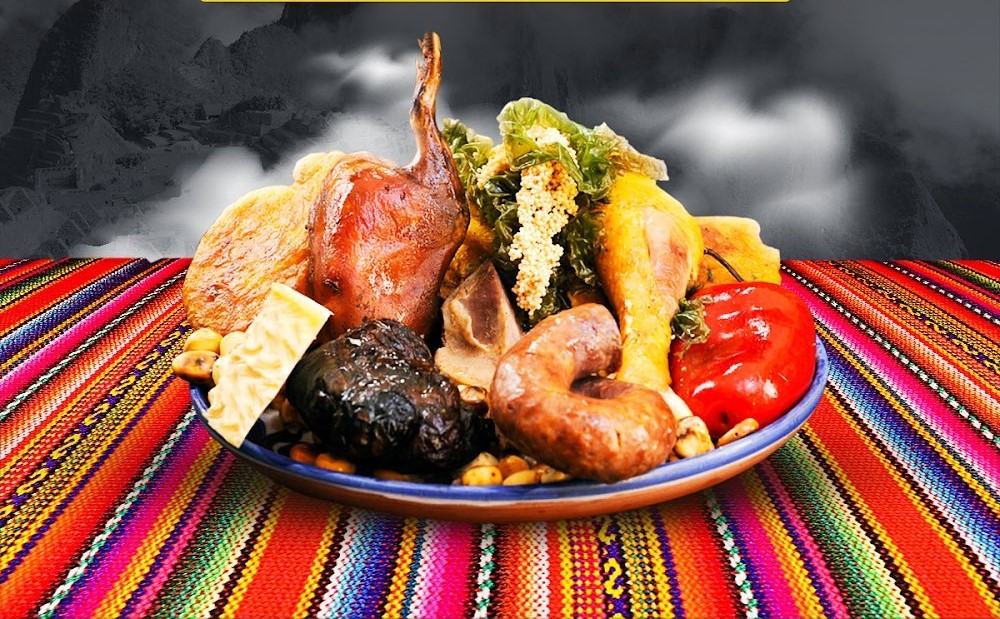
Toasted corn, seaweed, and fish eggs are also contained in this dish. One of the best parts of this dish is “la torreja,” a type of omelet cooked with potatoes, green onions, yellow squash, and corn flour with seasonings. Hot peppers are above an abundance of ingredients. The components are stacked high, and topped with spicy chili peppers.
La Octava & Bajada de Corpus
“La Octava” is the date on which the 15 saints march around Cusco’s main square. The event typically begins after lunch and extends up to 5 hours. Later, all the 15 saints return to their respective parishes, carried by all the devotes, dancing, drinking, and singing all along. The people in charge of organizing all the logistics to carry every saint are called “Carguyoq”.
Tips to Celebrate Corpus Christi
- We recommend bringing with you sunblock, a hat, sunglasses, and a windbreaker. This time of the year is the dry season, which means that it’ll be very hot in the mornings, and it’ll get cold at night.
- Cusco is more than 3000 meters above sea level and along the hot weather remember always stay hydrated.
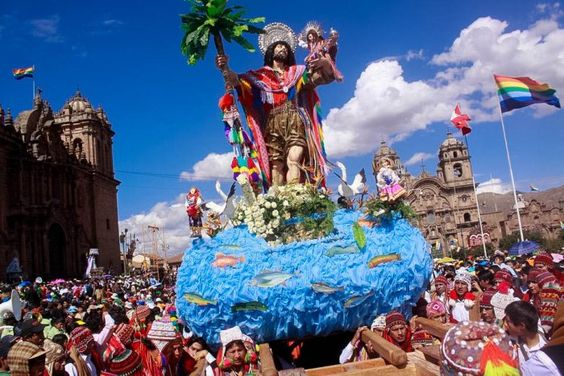
- Get a pair of comfortable trekking shoes. Believe us when we tell you you’ll walk a lot.
- Thousands of people will be flooding the streets, so we recommend booking in advance a restaurant or bar with balconies to take the best pictures of Corpus Christi.
- Unlike the Inti Raymi, the access is not restricted, so if you want to be right in the middle where the action takes place, be careful of your valuables. You’ll see thousands of people arriving at the plaza and moving around it!
This year’s Corpus Christi will be held on May 31st. want to participate? Viagens Machu Picchu can help you out to take part in this festival and many others around Peru. Let’s travel together to explore Cusco and all the destinations that Peru offers.
Viagens Machu Picchu, journeys that inspire, moments that last.

